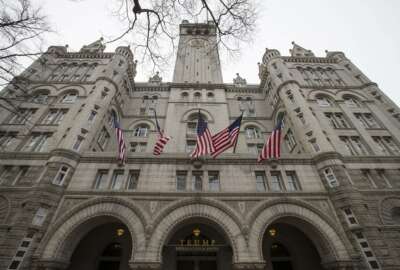
Access to Trump Hotel documents sparks another dispute between GSA and Congress
Even with the Trump Hotel potentially up for sale, GSA and House Democrats have once again clashed over an investigation into whether the president’s ties to ...
Even with the Trump Hotel potentially up for sale, the General Services Administration and House Democrats have once again clashed over an investigation into whether the president’s ties to a government lease violate the Constitution.
In their latest dispute, GSA officials and members of the House Transportation and Infrastructure Committee disagree over whether lawmakers have been given “reasonable accommodation” to review financial records related to the Trump Organization’s 100-year lease of the GSA-owned Old Post Office Building.
Committee Chairman Peter DeFazio (D-Ore.), in a subpoena last October, ordered GSA Administrator Emily Murphy to turn over “unredacted documents and communications” between the agency, the Trump Organization and members of the 2016 presidential transition team.
The subpoena set a Nov. 4, 2019 deadline for GSA to provide these documents, but DeFazio and Rep. Dina Titus (D-Nev.), chairwoman of the public buildings and emergency management subcommittee, said last month that the agency has failed to comply with the subpoena, setting a “pattern of obstruction and obstinance that is unacceptable.”
A GSA spokesperson told Federal News Network that the agency is in the process of responding to the committee’s Dec. 20 letter, but disputed DeFazio and Titus’s claim that the agency has tried to “stonewall access to the majority of relevant documents.”
“Contrary to the committee’s assertion in that letter, GSA offered on November 12, and again on November 18, to provide the committee an in-camera review of the tenant’s confidential financial records in unredacted form, provided that the committee agreed to not publicly disclose that information without GSA’s consent,” the spokesperson said. “Unfortunately, the committee has not accepted GSA’s offer, which remains open.”
The spokesperson added that GSA has already provided more than 10,000 pages of material to the committee on this issue.
Meanwhile, the agency’s legal team has told the committee that the only subpoenaed records it holds that have not already been handed over to the committee are confidential financial records from the Trump Organization and confidential legal memoranda prepared by its Office of Legal Counsel.
Because of the sensitive nature of these financial documents, GSA General Counsel Jack St. John, in a Nov. 18 letter to DeFazio, wrote that the agency agreed to an “in-camera” review of these records that was predicated on an “agreement to not publicly disclose the information contained in those records without GSA’s consent.”
As for legal memos on the matter drafted by GSA’s Office of Legal Counsel, St. John wrote in a Nov. 12 letter that the agency wouldn’t turn those over to the committee because they “are highly deliberative in nature and contain legal advice and attorney-client communications that implicate core confidentiality interests of the Executive Branch.”
The committee’s refusal to accept the terms of the “in-camera” review, St. John added, “suggests that its purpose in seeking that information is not legislative in nature.”
DeFazio and Titus, however, have pushed back on that characterization, saying the committee “would have provided GSA with ample notice if we decided that the public release of this information or references to it was necessary to fulfill the committee’s obligation to conduct appropriate oversight of GSA and was in the public’s interest.”
Outside Congress, legal inquiries into whether President Donald Trump benefiting from a GSA-leased property violates the Emoluments Clause of the Constitution began early in the Trump administration and remain ongoing. That question is the subject of three pending lawsuits against the president.
One lawsuit from the state of Maryland and the District of Columbia claims that regional hotels have felt “competitive injury” because international leaders are more likely to stay at the Trump Hotel. A federal appeals court reheard the case last month after a three-judge panel directed another judge to dismiss the lawsuit.
In May 2018, a federal judge ordered GSA to release more Trump Hotel documents following a Freedom of Information Act lawsuit when GSA limited the FOIA search query to email records, but not email attachments.
The judge also found GSA improperly redacted the names of Trump transition team officials, citing privacy concerns, even though their names and roles on the transition team were listed on a transition team website.
Last year, GSA’s inspector general found that the agency’s legal team improperly “ignored” legal questions about the Emoluments Clause. But rather than weigh in on whether or not the lease violated the Constitution, the IG’s office recommended GSA conduct a legal review of the issue.
GSA agreed to the legal review, and has submitted two corrective action plans to the Office of Inspector General, but agency IG Carol Ochoa told members of the committee at a September hearing that her office has not approved of either of those plans.
“It’s my understanding that GSA has not undertaken the analysis we requested,” Ochoa said.
DeFazio and Titus said that GSA has included language in new outleases that prevents members of Congress from being a party to them, but “has intentionally ignored the conflicts-of-interest posed by the President of the United States.”
Amid all of these lines in inquiry, the Associated Press has reported that the Trump Organization has considered possibly selling off its 100-year lease of the building because “people are objecting to us making so much money on the hotel.”
Financial disclosure documents show that the Trump Hotel brought in nearly $41 million, less than half a million more than it earned last year.
Copyright © 2024 Federal News Network. All rights reserved. This website is not intended for users located within the European Economic Area.
Jory Heckman is a reporter at Federal News Network covering U.S. Postal Service, IRS, big data and technology issues.
Follow @jheckmanWFED





